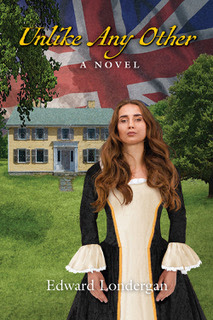Available from Amazon UK and Amazon US
The Story of An 18th Century Woman from A Prominent New England Family Who Went from A Life of Privilege to The Gallows. Bathsheba Spooner was the daughter of Timothy Ruggles, a general in the French and Indian War, president of the Stamp Act Congress, Chief Justice of the Court of Common Pleas, and a leading loyalist in Massachusetts during the Revolutionary War; the epitome of upper class. Based on a true story, the events that follow Bathsheba’s life, her decisions, and her ultimate demise will show readers that Bathsheba Spooner was, in fact, Unlike Any Other . . .
I'm pleased to welcome author Edward Londergan to The Writing Desk:
Tell us about your latest book.
Unlike Any Other is the story of Bathsheba Spooner, the daughter of a wealthy and powerful politician, staunch British Loyalist, and the most hated man in Massachusetts. Raised in wealth and privilege, Bathsheba dreams of a life of happiness and grandeur. To protect her from the coming rebellion, her father forces Bathsheba to marry an affluent businessman she soon despises.
After ten years of marital misery, with the turmoil of war swirling around her, she is desperate for love and affection. After saving a 16-year-old American soldier from certain death, they begin an affair, and she soon finds herself pregnant. Loathing her husband and fearing public humiliation, she pleads with the young soldier to murder her husband, but instead, he flees.
Her British sympathies make her a pariah in a town of ardent rebels but lead two British prisoners-of-war to her door, and she conspires with them, and the young soldier upon his return to claim her as his own, to murder her husband. In the first murder trial after the Declaration of Independence, the unending hatred for her and her father is unleashed upon her through the vengeance of a zealous patriot.
What is your preferred writing routine?
I write late morning and mid afternoon. Going through my daily routine helps ground me. I don’t have a set number of words I write. Some days it’s in the thousands, other days it’s a couple of hundred. I believe that it’s not the quantity but the quality that counts.
What advice do you have for aspiring writers?
My advice is to start writing and not stop. Don’t judge the first draft; it’s supposed to be bad. That’s why it’s a first draft. Write the story now and edit it later. Don’t be afraid of editing; it makes the story better. Finish what you start. Don’t let a story sit for years. Get on with it; finish it now. Read every day. Read to enjoy but also to learn what makes a great book great and a bad book bad.
What have you found to be the best way to raise awareness of your books?
I’ve found that talking with people, whether in small groups or presenting to larger audiences, is the best way to get people aware of my stories. Word of mouth and social media are great ways to get the word out. I present at libraries, historical societies, and any group that will listen to me. I know this latest book is a very good story because it’s been fascinating people for 244 years. People will listen.
Tell us something unexpected you discovered during your research.
I found that, even here in Massachusetts, the birthplace of the American Revolution (don’t tell the people in Virginia that as they think it started there), the support for the break from Britain was not as overwhelming or as cut and dried as I thought. Family members fought against each other. In many ways, it was a civil war.
What was the hardest scene you remember writing?
The trial scene was the most difficult. One of the problems is that there are so many conflicting accounts that it’s impossible to know all the details of what happened. The justices and lawyers kept notes, but some are more to themselves than anything truly useful. In addition, realizing how shockingly badly the trial was conducted was stunning. The four defendants had one inexperienced attorney representing them all, even though they had different strategies for their defense. What it came down to is that the jurors, and most of the residents of the area, wanted the prisoners to die.
What are you planning to write next?
I’m in the editing stage of a contemporary fiction story about the importance of family and personal redemption. After that, it’s a story of a road trip between a dad and his fourteen-year-old son. That’s going to be a special story. I can feel it.
Edward Londergan
# # #
About the Author
Ed Londergan is the author of the award-winning books The Devils’ Elbow and The Long Journey Home. Having researched American history for many years, he is a frequent speaker with a focus on colonial Massachusetts. A graduate of Holy Cross, he lives in Warren, Massachusetts. Find out more at Ed's website http://www.edlondergan.com/ and find him on Facebook and Twitter @EdLondergan



Thank you so much for hosting the blog tour for Unlike Any Other.
ReplyDeleteAll the best,
Mary Anne
The Coffee Pot Book Club